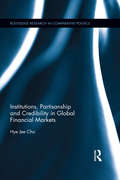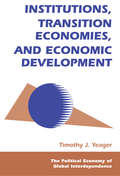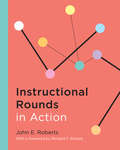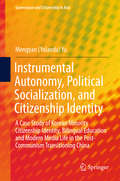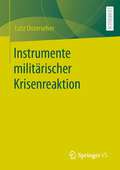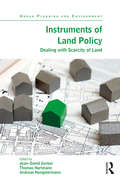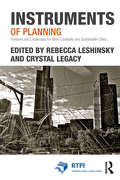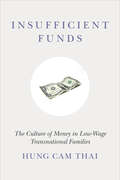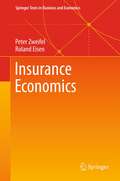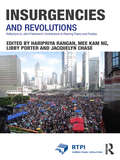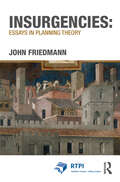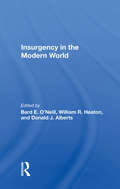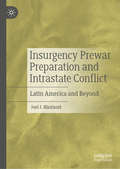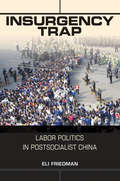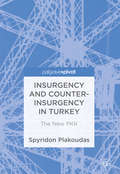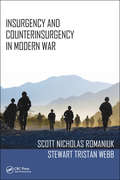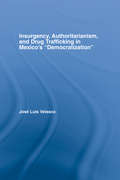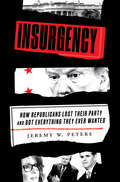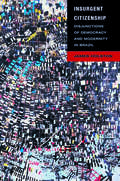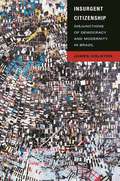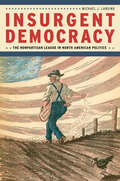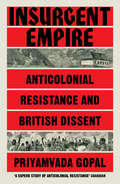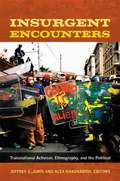- Table View
- List View
Institutions, Partisanship and Credibility in Global Financial Markets (Routledge Research in Comparative Politics)
by Hye Jee ChoIncreasingly integrated global financial markets have been shaken by a series of severe shocks in recent decades, from Mexico’s Tequila crisis to the upheavals in the Eurozone. These crises have demonstrated that signs of uncertain local economic and political conditions can result in market fluctuations which in turn cause economic, social, and political instability. Such instability is particularly severe for developing countries that rely heavily on international financial markets for their financial needs. Building credibility in these markets is therefore important for national governments who wish to prevent market panic and capital flight and, ultimately, to achieve stable economic growth. Earlier studies have argued that institutional arrangements that constrain governments and commit them to protecting private property rights and market-friendly policies can send a strong positive signal to the markets about a given country’s sovereign credibility. This book argues, however, that the market perception of such credibility-building institutions is significantly contingent on which party governs the country. Formal institutions confer significant credibility-building effects on left-wing governments, whereas less or no significant effects are enjoyed by right-wing governments. And beyond that, any significant changes in a country’s institutional landscape—such as a breakdown of democracy or joining an international organization that can influence domestic politics—have particularly strong impact on the credibility of left-wing governments. This argument is supported by a quantitative analysis of sovereign credit ratings data collected from around 90 developing countries from 1980 to 2007, by case studies from South Asia, Eastern Europe and Latin America, and by face-to-face interviews with 24 financial market experts based in Hong Kong, Seoul, and Paris.
Institutions, Transition Economies, And Economic Development (Political Economy Of Global Interdependence Ser.)
by Tim YeagerWhy are some nations wealthy while others are desperately poor? Despite the rapid advancement of technology and the free flow of information provided by computers, many poor nations are falling further behind the wealthy nations of the world. Why is it that these poorer nations cannot catch up? Until recently, economic theory provided limited help in answering these questions. But the New Institutional Economics, a rapidly growing body of economic theory, may provide the answers. Timothy Yeager's Institutions, Transition Economies, and Economic Development clearly explains the New Institutional Economics, and applies its tenets to the transition economies of Poland and Russia. Readers will gain a perspective on transition and developing economies that has never been explored before in a single book.
Instructional Rounds in Action
by Richard E. Elmore John E. RobertsInstructional Rounds in Action is an invaluable guide for those involved in implementing instructional rounds as the foundation and framework for systemic improvement in schools. Over the past few years, districts across the United States, Canada, and Australia have begun implementing "instructional rounds," a set of ideas and practices for advancing systemic, district-wide improvement. But as they do so, practical and theoretical questions arise. <P><P>Roberts offers a powerful analysis of how instructional rounds can work "on the ground." His book weaves together the voices of stakeholders at all levels--teachers, principals, and district personnel--and presents a number of protocols to support instructional rounds.
Instructional Rounds in Action: NULL
by John E. RobertsInstructional Rounds in Action is an invaluable guide for those involved in implementing instructional rounds as the foundation and framework for systemic improvement in schools. Over the past few years, districts across the United States, Canada, and Australia have begun implementing &“instructional rounds,&” a set of ideas and practices for advancing systemic, district-wide improvement. But as they do so, practical and theoretical questions arise. Roberts offers a powerful analysis of how instructional rounds can work &“on the ground.&” His book weaves together the voices of stakeholders at all levels—teachers, principals, and district personnel—and presents a number of protocols to support instructional rounds.
Instrumental Autonomy, Political Socialization, and Citizenship Identity
by Mengyan Yolanda YuThis book offers essential insights into Chinese Korean minority youth citizenship identity development during their high school and university education period out of their political socialization experience. It investigates how they develop their citizenship identity with the state through bilingual education and media exposure, as an outcome of the entangled relationship between state power and economic globalization. The book demonstrates to readers how to apply the abstract conceptual framework of identity politics and ideology construction, nurtured by both civil culture and political evolvement, to a specific case with operationalized measurement extracted from political socialization concepts so as to understand and rationalize identity development. This approach offers both an in-depth way to penetrate further in the discourse construction that shapes identity politics and an innovative means of measuring and explaining relevant relationships.
Instrumente militärischer Krisenreaktion
by Lutz UnterseherNach den jüngsten Desastern bewaffneter Machtprojektion wird in diesem Buch unternommen, einen rationalen Diskurs über militärische Krisenintervention wiederzubeleben: im Sinne einer stabilitätsorientierten Sicherheitspolitik. Dabei werden Elemente der Landstreitkräfte auf ihre Eignung hin untersucht.
Instruments of Land Policy: Dealing with Scarcity of Land (Urban Planning and Environment)
by Thomas Hartmann Jean-David Gerber Andreas HengstermannIn dealing with scarce land, planners often need to interact with, and sometimes confront, property right-holders to address complex property rights situations. To reinforce their position in situations of rivalrous land uses, planners can strategically use and combine different policy instruments in addition to standard land use plans. Effectively steering spatial development requires a keen understanding of these instruments of land policy. This book not only presents how such instruments function, it additionally examines how public authorities strategically manage the scarcity of land, either increasing or decreasing it, to promote a more sparing use of resources. It presents 13 instruments of land policy in specific national contexts and discusses them from the perspectives of other countries. Through the use of concrete examples, the book reveals how instruments of land policy are used strategically in different policy contexts.
Instruments of Planning: Tensions and challenges for more equitable and sustainable cities (RTPI Library Series)
by Rebecca Leshinsky Crystal LegacyInstruments of Planning: Tensions and Challenges for more Equitable and Sustainable Cities critically explores planning’s instrumentality to deliver important social and environmental outcomes in neoliberal planning landscapes. Because each instrument is unique and may be tailored to its own jurisdictional needs, Instruments of Planning is a compendium of case studies from urban regions in Australia, Canada, the United States and Europe, providing readers with a collection that critically challenges the role and potential of planning instruments and instrumentality across a range of contexts. Instruments of Planning captures the political, institutional, and economic challenges that confront planning. It examines planning instruments designed to assist with strategic planning and implementation, and considers the role that technology plays in unpacking and understanding complexity in planning. Written by Rebecca Leshinsky and Crystal Legacy of RMIT University in Melbourne, Australia, this book fills the gap in planning theory about the instrumentality of planning in the neoliberal urban context. It is essential reading for students, urban researchers, policy analysts and planning practitioners.
Insufficient Funds: The Culture of Money in Low-Wage Transnational Families
by Hung Cam ThaiEvery year migrants across the globe send more than $500 billion to relatives in their home countries, and this circulation of money has important personal, cultural, and emotional implications for the immigrants and their family members alike. Insufficient Funds tells the story of how low-wage Vietnamese immigrants in the United States and their poor, non-migrant family members give, receive, and spend money. Drawing on interviews and fieldwork with more than one hundred members of transnational families, Hung Cam Thai examines how and why immigrants, who largely earn low wages as hairdressers, cleaners, and other "invisible" workers, send home a substantial portion of their earnings, as well as spend lavishly on relatives during return trips. Extending beyond mere altruism, this spending is motivated by complex social obligations and the desire to gain self-worth despite their limited economic opportunities in the United States. At the same time, such remittances raise expectations for standards of living, producing a cascade effect that monetizes family relationships. Insufficient Funds powerfully illuminates these and other contradictions associated with money and its new meanings in an increasingly transnational world.
Insurance Economics
by Peter Zweifel Roland EisenInsurance Economics brings together the economic analysis of decision making under risk, risk management and demand for insurance by individuals and corporations, objectives pursued and management tools used by insurance companies, the regulation of insurance, and the division of labor between private and social insurance. Appropriete both for advanced undergraduate and graduate students of economics, management, and finance, this text provides the background required to understand current research. Predictions derived from theoretical argument are not only stated but confronted with empirical evidence. Throughout the book, conclusions summarize results, helping readers to check their knowledge and understanding. Issues discussed include paradoxa in decision making under risk, selection of favorable risks by insurers, the possibility of a "death spiral" in insurance markets, and future challenges such as re-regulation in the wake of the 2007-09 financial crisis and the increasing availability of generic information.
Insurance Settlements
by Ronald MillerInsurance Settlements Increase settlement values with this insider's guide to the insurance settlement process. Insurance Settlements opens long-locked doors to insurance claims departments, gathering the experience of more than 25 veteran claims managers, attorneys, medical experts, and adjusters. Discover in days what most plaintiffs' attorneys take years to learn. This book reveals how to: * Demonstrate to the adjuster that you know what you are doing * Determine when and what to say for maximum impact * How to help the adjuster sell your client's damages to his superiors * Draft effective demand letters * Evaluating soft tissue injuries * Break cases free from common logjams * Prove pain and suffering * Get realistic offers from adjusters * Counter common insurance settlement tactics * Value cases using traditional insurance company techniques * Obtain top dollar
Insurgencies and Revolutions: Reflections on John Friedmann’s Contributions to Planning Theory and Practice (RTPI Library Series)
by Libby Porter Haripriya Rangan Mee Kam Ng Jacquelyn ChaseOver the past six or more decades, John Friedmann has been an insurgent force in the field of urban and regional planning, transforming it from its traditional state-centered concern for establishing social and spatial order into a radical domain of collaborative action between state and civil society for creating ‘the good society’ in the present and future. By opening it up to theoretical engagement with a wide range of disciplines, Friedmann’s contributions have revolutionised planning as a transdisciplinary space of critical thinking, social learning, and reflective practice. Insurgencies and Revolutions brings together former students, close research associates, and colleagues of John Friedmann to reflect on his contributions to planning theory and practice. The volume is organized around five broad themes where Friedmann’s contributions have risen to challenge established paradigms and generated the space for revolutionary thinking and action in urban and regional planning – Theorising hope; Economic development and regionalism; World cities and the Good city; Social learning, empowered communities, and citizenship; and Chinese cities. The essays by the authors reflect their engagement with his ideas and the new directions in which they have taken these in their work in planning theory and practice.
Insurgencies: Essays in Planning Theory (RTPI Library Series)
by John FriedmannFor nearly fifty years John Friedmann's writings have not just led the academic study of the discipline, but have given shape and direction to the planning profession itself. Covering transactive planning, radical planning, the concept of the Good City, civil society, rethinking poverty and the diversity of planning cultures, this collection of Friedmann's most important and influential essays tells a coherent and compelling story about how the evolution of thinking about planning over several decades has helped to shape its practice. With each essay given a new introduction to establish its context and importance, this is an ideal text for the study of planning theory and history.
Insurgency In The Modern World
by Bard E. O'Neill William R. Heaton Donald J. AlbertsWhile all instances of insurgency have elements in common, the circumstances that precipitate them and the forms they take vary immensely. The editors of this book synthesize the literature on insurgency to provide an analytical framework that outlines categories of insurgent movements (secessionist, revolutionary, restorational, reactionary, conse
Insurgency Prewar Preparation and Intrastate Conflict: Latin America and Beyond
by Joel J. BlaxlandThis book provides a new approach to explaining prolonged rebellions and insurgent wars, as well as a more nuanced and multi-faceted account of the entire lifespans of rebel and insurgent groups. Since 1945, rebel and insurgent groups have increasingly dragged larger, better funded, and ostensibly militarily superior regimes into protracted intrastate conflicts. This book demonstrates how they were able to endure the hardships of warfare thanks to decisions made before the conflict erupted––a period of time the author refers to as “incubation.” Using case studies on Latin American insurgencies, the author demonstrates that their capacity to endure was directly associated with both the length and quality of each group’s prewar preparations.
Insurgency Trap: Labor Politics in Postsocialist China
by Eli FriedmanDuring the first decade of the twenty-first century, worker resistance in China increased rapidly despite the fact that certain segments of the state began moving in a pro-labor direction. In explaining this, Eli Friedman argues that the Chinese state has become hemmed in by an "insurgency trap" of its own devising and is thus unable to tame expansive worker unrest. Labor conflict in the process of capitalist industrialization is certainly not unique to China and indeed has appeared in a wide array of countries around the world. What is distinct in China, however, is the combination of postsocialist politics with rapid capitalist development.Other countries undergoing capitalist industrialization have incorporated relatively independent unions to tame labor conflict and channel insurgent workers into legal and rationalized modes of contention. In contrast, the Chinese state only allows for one union federation, the All China Federation of Trade Unions, over which it maintains tight control. Official unions have been unable to win recognition from workers, and wildcat strikes and other forms of disruption continue to be the most effective means for addressing workplace grievances. In support of this argument, Friedman offers evidence from Guangdong and Zhejiang provinces, where unions are experimenting with new initiatives, leadership models, and organizational forms.
Insurgency and Counter-Insurgency in Turkey: The New Pkk
by Spyridon PlakoudasThis book seeks to answer the “why” and “how” questions about the insurgency of the PKK, a militant left-wing group of Turkey’s Kurds, in Turkey. The PKK has been inter-locked in an intermittent war against Turkey since 1984 in the name of Kurdish nationalism. The author combines insights of Strategy and IR - from strategy and tactics in irregular warfare to peace negotiations between state authorities and insurgents, with data from qualitative research, to achieve two inter-related objectives: first, assess the current state of affairs and predict the future course of the conflict and, secondly, draw general conclusions on how protracted conflicts can end and how.
Insurgency and Counterinsurgency in Modern War
by Scott Nicholas Romaniuk Stewart Tristan WebbA collection of original works covering all aspects of insurgency and counterinsurgency through a multinational lens, Insurgency and Counterinsurgency in Modern War addresses the need to look beyond the United States and other prominent counterinsurgency actors in the contemporary world. It addresses the need to look beyond the United States and other preeminent counterinsurgency actors in the contemporary world while reassessing some of the latent and burgeoning insurgent organizations and networks around the globe. It also suggests alternative approaches to understanding insurgency, counterinsurgency, and conventional and asymmetric warfare as they relate to insurgency and counterinsurgency.
Insurgency, Authoritarianism, and Drug Trafficking in Mexico's Democratization
by Jose L. VelascoMexico's "democratic transition" has created a competitive electoral system and a formally plural state. Besides, a peculiar wave of insurgency, started in 1994, has challenged the alleged moderating effect of democratic transition. This book argues that socioeconomic inequality is the main factor behind this combination of democratic and undemocratic trends.
Insurgency: How Republicans Lost Their Party and Got Everything They Ever Wanted
by Jeremy W. PetersHow did the party of Lincoln become the party of Trump? From an acclaimed political reporter for The New York Times comes the definitive story of the mutiny that shattered American politics.&“A bracing account of how the party of Lincoln and Reagan was hijacked by gadflies and grifters who reshaped their movement into becoming an anti-democratic cancer that attacked the U.S. Capitol.&”—Joe ScarboroughJeremy W. Peters&’s epic narrative chronicles the fracturing of the Republican Party. Insurgency is a fantasia-like story of a party establishment that believed it could control the dark energy it helped foment—right up until it suddenly couldn&’t. How, Peters asks, did conservative values that Republicans claimed to cherish, like small government, fiscal responsibility, and morality in public service, get completely eroded as an unshakable faith in Donald Trump grew to define the party?The answer is a tale traced across three decades—with new reporting and firsthand accounts from the people who were there—of populist uprisings that destabilized the party. The signs of conflict were plainly evident for anyone who cared to look. After Barack Obama&’s election convinced many Republicans that they faced an existential demographics crossroads, many believed the only way to save the party was to create a more inclusive and diverse coalition. But party leaders underestimated the energy and popular appeal of those who would pull the party in the opposite direction. They failed to see how the right-wing media they hailed as truth-telling was warping the reality in which their voters lived. And they did not understand the complicated moral framework by which many conservatives would view Trump, leading evangelicals and one-issue voters to shed Republican orthodoxy if it delivered a Supreme Court that would undo Roe v. Wade.In this sweeping history, Peters details key junctures and episodes to unfurl the story of a revolution from within. Its architects had little interest in the America of the new century but a deep understanding of the iron will of a shrinking minority. With Trump as their polestar, their gamble paid greater dividends than they&’d ever imagined, extending the life of far-right conservatism in United States domestic policy into the next half century.
Insurgent Citizenship: Disjunctions Of Democracy And Modernity In Brazil (In-formation Ser.)
by James Holston<P>Insurgent citizenships have arisen in cities around the world. <P>This book examines the insurgence of democratic citizenship in the urban peripheries of São Paulo, Brazil, its entanglement with entrenched systems of inequality, and its contradiction in violence.<P> James Holston argues that for two centuries Brazilians have practiced a type of citizenship all too common among nation-states--one that is universally inclusive in national membership and massively inegalitarian in distributing rights and in its legalization of social differences.<P> But since the 1970s, he shows, residents of Brazil's urban peripheries have formulated a new citizenship that is destabilizing the old.<P> Their mobilizations have developed not primarily through struggles of labor but through those of the city--particularly illegal residence, house building, and land conflict. <P>Yet precisely as Brazilians democratized urban space and achieved political democracy, violence, injustice, and impunity increased dramatically.<P> Based on comparative, ethnographic, and historical research, Insurgent Citizenship reveals why the insurgent and the entrenched remain dangerously conjoined as new kinds of citizens expand democracy even as new forms of violence and exclusion erode it.<P> Rather than view this paradox as evidence of democratic failure and urban chaos, Insurgent Citizenship argues that contradictory realizations of citizenship characterize all democracies--emerging and established. <P>Focusing on processes of city- and citizen-making now prevalent globally, it develops new approaches for understanding the contemporary course of democratic citizenship in societies of vastly different cultures and histories.
Insurgent Citizenship: Disjunctions of Democracy and Modernity in Brazil (In-Formation)
by James HolstonInsurgent citizenships have arisen in cities around the world. This book examines the insurgence of democratic citizenship in the urban peripheries of São Paulo, Brazil, its entanglement with entrenched systems of inequality, and its contradiction in violence. James Holston argues that for two centuries Brazilians have practiced a type of citizenship all too common among nation-states--one that is universally inclusive in national membership and massively inegalitarian in distributing rights and in its legalization of social differences. But since the 1970s, he shows, residents of Brazil's urban peripheries have formulated a new citizenship that is destabilizing the old. Their mobilizations have developed not primarily through struggles of labor but through those of the city--particularly illegal residence, house building, and land conflict. Yet precisely as Brazilians democratized urban space and achieved political democracy, violence, injustice, and impunity increased dramatically. Based on comparative, ethnographic, and historical research, Insurgent Citizenship reveals why the insurgent and the entrenched remain dangerously conjoined as new kinds of citizens expand democracy even as new forms of violence and exclusion erode it. Rather than view this paradox as evidence of democratic failure and urban chaos, Insurgent Citizenship argues that contradictory realizations of citizenship characterize all democracies--emerging and established. Focusing on processes of city- and citizen-making now prevalent globally, it develops new approaches for understanding the contemporary course of democratic citizenship in societies of vastly different cultures and histories.
Insurgent Democracy: The Nonpartisan League in North American Politics
by Michael J. LansingIn 1915, western farmers mounted one of the most significant challenges to party politics America has seen: the Nonpartisan League, which sought to empower citizens and restrain corporate influence. Before its collapse in the 1920s, the League counted over 250,000 paying members, spread to thirteen states and two Canadian provinces, controlled North Dakota's state government, and birthed new farmer-labor alliances. Yet today it is all but forgotten, neglected even by scholars. Michael J. Lansing aims to change that. Insurgent Democracy offers a new look at the Nonpartisan League and a new way to understand its rise and fall in the United States and Canada. Lansing argues that, rather than a spasm of populist rage that inevitably burned itself out, the story of the League is in fact an instructive example of how popular movements can create lasting change. Depicting the League as a transnational response to economic inequity, Lansing not only resurrects its story of citizen activism, but also allows us to see its potential to inform contemporary movements.
Insurgent Empire: Anticolonial Resistance and British Dissent
by Priyamvada GopalUpsets received views to show how rebellious colonies changed British attitudes to empireMuch has been written on the how colonial subjects took up British and European ideas and turned them against empire when making claims to freedom and self-determination. The possibility of reverse influence has been largely overlooked. Insurgent Empire shows how Britain's enslaved and colonial subjects were not merely victims of empire and subsequent beneficiaries of its crises of conscience but also agents whose resistance both contributed to their own liberation and shaped British ideas about freedom and who could be free. This book examines dissent over the question of empire in Britain and shows how it was influenced by rebellions and resistance in the colonies from the West Indies and East Africa to Egypt and India. It also shows how a pivotal role in fomenting dissent was played by anti-colonial campaigners based in London at the heart of the empire.
Insurgent Encounters: Transnational Activism, Ethnography, and the Political
by Alex Jeffrey S. Juris KhasnabishInsurgent Encounters illuminates the dynamics of contemporary transnational social movements, including those advocating for women and indigenous groups, environmental justice, and alternative--cooperative rather than exploitative--forms of globalization. The contributors are politically engaged scholars working within the social movements they analyze. Their essays are both models of and arguments for activist ethnography. They demonstrate that such a methodology has the potential to reveal empirical issues and generate theoretical insights beyond the reach of traditional social-movement research methods. Activist ethnographers not only produce new understandings of contemporary forms of collective action, but also seek to contribute to struggles for social change. The editors suggest networks and spaces of encounter as the most useful conceptual rubrics for understanding shape-shifting social movements using digital and online technologies to produce innovative forms of political organization across local, regional, national, and transnational scales. A major rethinking of the practice and purpose of ethnography, Insurgent Encounters challenges dominant understandings of social transformation, political possibility, knowledge production, and the relation between intellectual labor and sociopolitical activism. Contributors. Giuseppe Caruso, Maribel Casas-Cortés, Janet Conway, Stéphane Couture, Vinci Daro, Manisha Desai, Sylvia Escárcega, David Hess, Jeffrey S. Juris, Alex Khasnabish, Lorenzo Mosca, Michal Osterweil, Geoffrey Pleyers, Dana E. Powell, Paul Routledge, M. K. Sterpka, Tish Stringer
